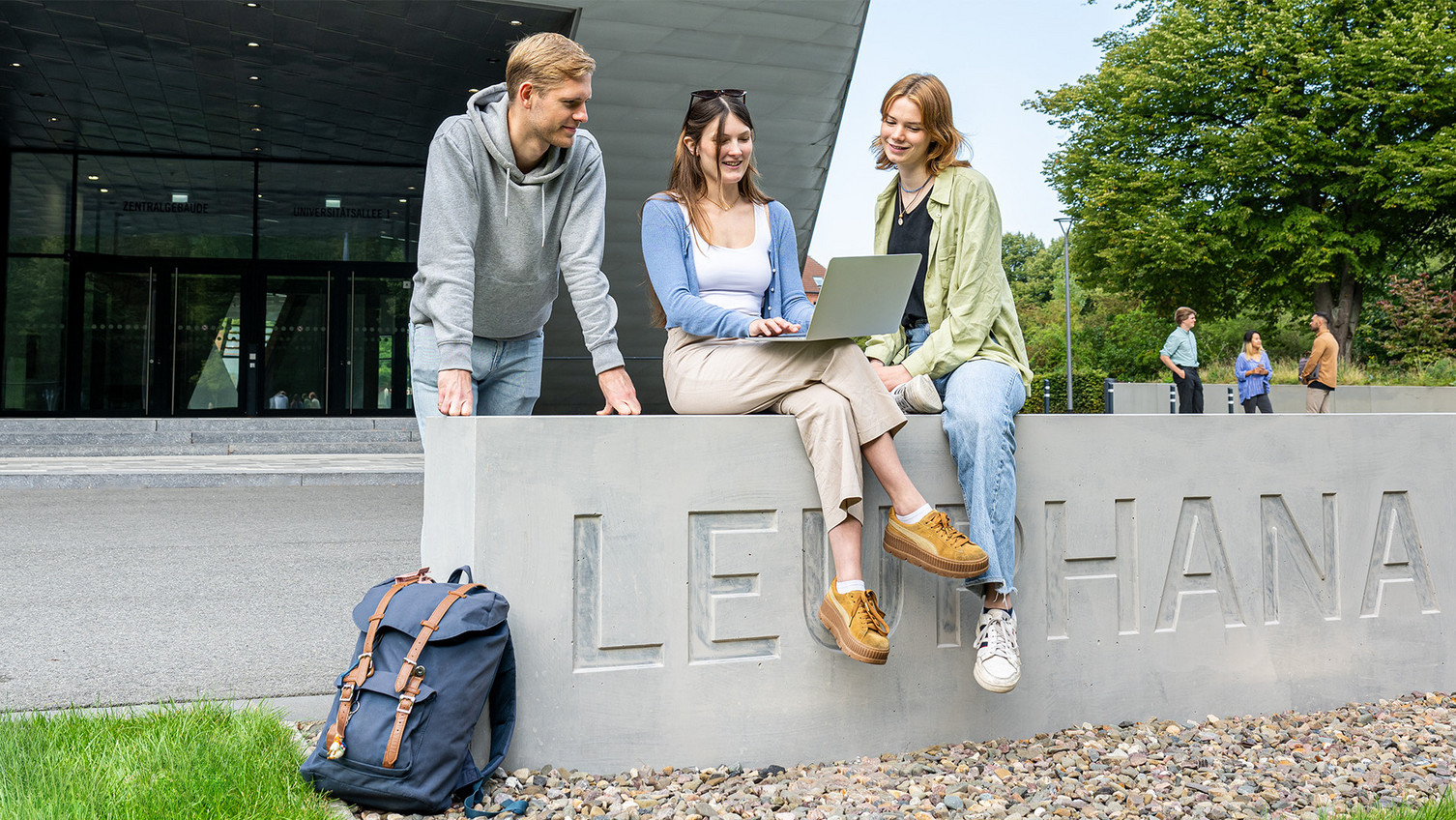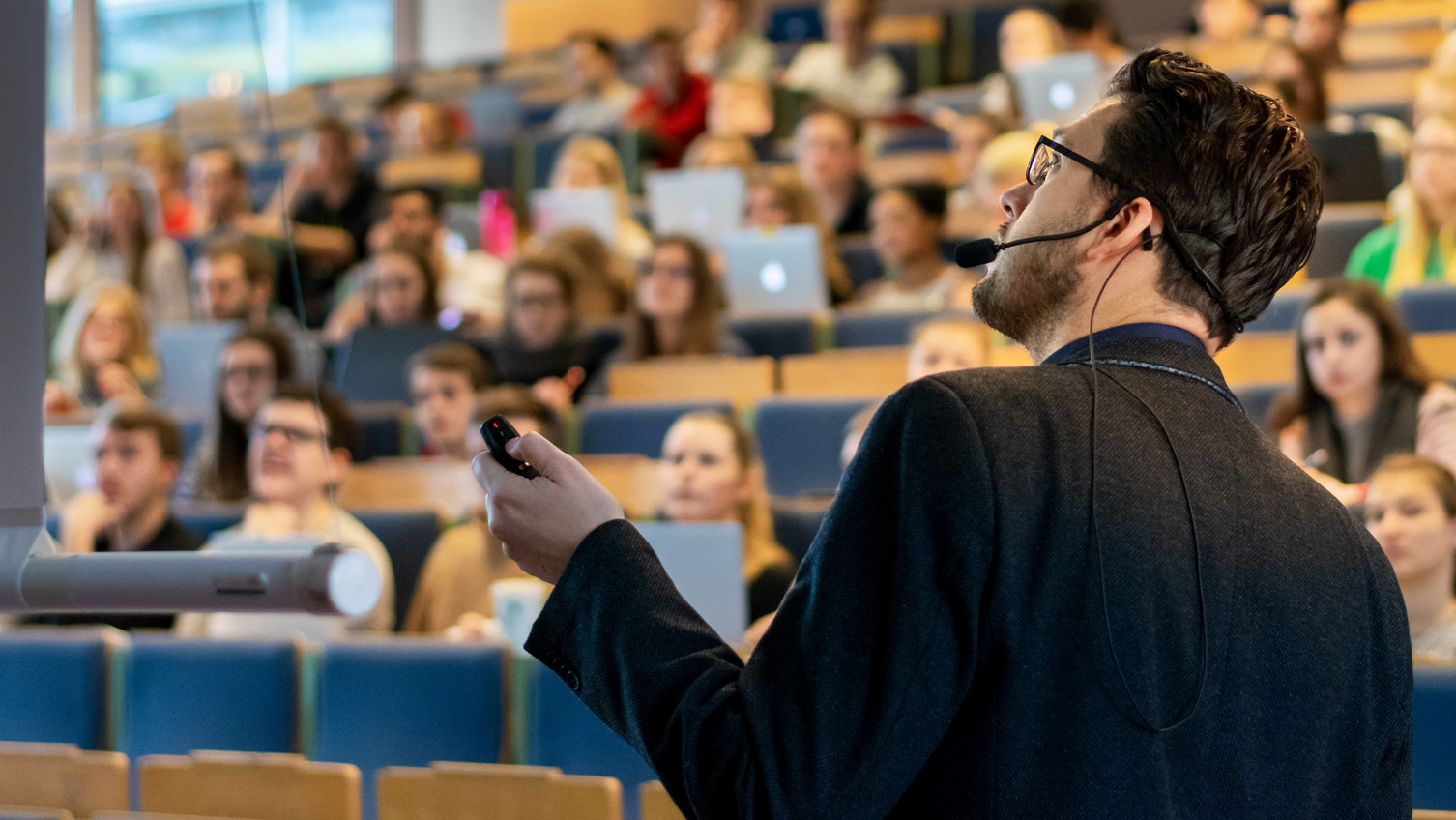AoL (Assurance of Learning)
Assurance of Learning (AOL) ist ein Qualitätssicherungsinstrument, das Studienprogramme als Ganzes bewertet. Es ermöglicht es, zu überprüfen, ob Studierende die Kompetenzen und Fähigkeiten erwerben, die das Programm anbieten soll. Es bewertet Sie nicht, sondern verbessert das Programm auf der Grundlage dessen, was und wie alle Studierenden lernen.
Wenn Sie mehr Informationen erhalten möchten, gibt es zwei separate Abschnitte unten: Einer für Studierende und einer für akademische Mitarbeiter.
Studierendenperspektive
Studierendeninformationen & Beteiligung
 ©Leuphana/Markus Tiemann
©Leuphana/Markus Tiemann
Was bedeutet AOL dür dich und warum ist es wichtig?
Der AOL-Prozess hilft uns dabei, Studiengänge anzupassen, Inhalte zu verbessern und sicherzustellen, dass Ihr Abschluss auch in der realen Welt relevant bleibt. AOL basiert auf Informationen, die wir im Rahmen der Programme sammeln. Von Zeit zu Zeit kann ein Teil Ihrer Studienleistungen, wie etwa Ihre Abschlussarbeit oder ein Projekt, anonym verwendet werden, um zu bewerten, ob die Studierenden zentrale Lernziele erreichen. Sie müssen nichts zusätzlich tun – Ihre Arbeit trägt jedoch dazu bei, Ihr Studienprogramm weiter zu verbessern.
Was misst AOL?
Assurance of Learning (AOL) misst, ob Studierende die programmspezifischen Kompetenzziele ihres Studiengangs erreichen. Während die konkreten Lernziele je nach Studiengang variieren, basieren sie alle auf vier übergeordneten Dimensionen:
Fachliches Wissen: Verstehen und Anwenden der zentralen Konzepte Ihres Fachgebiets.
Wissenschaftliche und forschungsbezogene Fähigkeiten: Wissenschaftliches Denken, kritische Reflexion und verantwortungsvolle Forschung.
Unternehmerisches und lösungsorientiertes Denken: Entwicklung innovativer und praxisnaher Ansätze zur Bewältigung von Herausforderungen.
Verantwortungsbewusstes Management: Studierende treffen verantwortungsvolle Entscheidungen.
Wenn Sie die spezifischen Ziele für Ihren Studiengang einsehen möchten, finden Sie diese unten in den ausklappbaren Abschnitten.
Wie kannst du dich einbringen?
Ja! Sie können dem Quality Circle Ihres Studiengangs beitreten – schreiben Sie uns einfach eine E-Mail an aol@leuphana.de.
Der beste Ort, um Bedürfnisse, Wünsche und Anliegen zu äußern, ist der Quality Circle selbst. Wenn Sie neugierig sind, wie das Studierenden-Feedback dort eingebunden wird, hier einige Informationen:
Sie und alle Studierenden Ihres Majors bzw. Masterprogramms werden über myStudy eingeladen, sich mit Professor*innen und Koordinator*innen Ihres Studiengangs zu treffen. In diesem Rahmen können Sie Feedback geben, Ideen einbringen und gemeinsam das Studienumfeld verbessern. Sie müssen keine Expertin oder kein Experte sein – es reicht, wenn Sie die Perspektive Ihrer Kohorte einbringen. AOL hilft dabei, Studiengänge besser, gerechter und relevanter zu gestalten. Machen Sie mit, gestalten Sie die Zukunft Ihres Studiums mit und bringen Sie Ihre Stimme ein!
Hier sind die Kompetenzziele für Ihr Studienprogramm:
Knowledge and understanding: Students demonstrate integrated academic knowledge and understanding of business information systems.
The student has solid knowledge on core theories, concepts, and models in (business) information systems.
The student reflects on the limits of theories, concepts, and models.
The student applies academic concepts and theories to practical and/or theoretical problems in (business) information systems.
Academic skills: Students master basic scientific working techniques and justify their own decisions and steps of action.
The student poses relevant research questions.
The student develops appropriate research and/or development design.
The student applies research and/or development methods to draw theoretical and/or practical conclusions.
Solutions for complex problems: Students develop and evaluate solution-oriented propositions.
The student outlined the relevance of the problem statement or research question for its context.
The student appropriately developed specific concepts or artifacts (e.g. an algorithm, a model, a program) for implementation.
The student discussed how the solution contributed to research and advanced the knowledge in the respective field.
Knowledge and expertise: Students critically reflect and apply academic knowledge in the field of management and entrepreneurship.
The student has profound knowledge on core theories, concepts, and models of the field of management and entrepreneurship.
The student applied scientifically based theories, concepts, models, and methods, to practical and/or theoretical problems.
The student recognizes and understands how systems are embedded within different domains and different scales, analyses complex systems, and deals with uncertainty.
Academic skills: Students work independently in an academic context and justify and reflect on their own actions.
The student knows and understands relevant data and its availability.
The student chose and applied a sophisticated and/or specialized research design.
The student critically reflects on applied theories and methods as well as their own conclusions.
Entrepreneurial thinking: Students develop and evaluate solution-oriented propositions.
The student outlined the relevance of the problem statement or research question from a theoretical and practical perspective.
The student discussed the implications of the topic and/or the findings for theory and practice.
The students developed (and implemented) innovative solution options that further innovative activities.
The student developed convincing propositions for solving the project tasks.
Responsible management: Students act responsibly in their decision-making.
The student critically reflects on the relations between business and society: The student has profound knowledge of responsible management and identifies important aspects concerning responsible management in a given situation.
The student considered principles and/or practices of responsible management: The student negotiates (sustainability) values, principles, goals, and targets, in a context of conflicts of interests and trade-offs, uncertain knowledge and/or contradictions.
Knowledge and expertise: Students critically reflect and apply academic knowledge in the field of sustainable accounting and finance.
The student has profound knowledge on core theories, concepts, and models of the field of sustainable accounting and finance.
The student applied scientifically based theories, concepts, models, and methods, to practical and/or theoretical problems.
The student recognizes and understands how systems are embedded within different domains and different scales, analyses complex systems, and deals with uncertainty.
Academic skills: Students work independently in an academic context and justify and reflect on their own actions.
The student knows and understands relevant data and its availability.
The student chose and applied a sophisticated and/or specialized research design.
The student critically reflected on applied theories and methods as well as their own conclusions.
Entrepreneurial thinking: Students develop and evaluate solution-oriented propositions.
The student outlined the relevance of the problem statement or research question from a theoretical and practical perspective.
The student discussed the implications of the topic and/or the findings for theory and practice.
The students developed (and implemented) innovative solution options that further innovative activities.
The student developed convincing propositions for solving the project tasks.
Responsible management: Students act responsibly in their decision-making.
The student critically reflects on the relations between business and society: The student has profound knowledge of responsible management and identifies important aspects concerning responsible management in a given situation.
- The student considered principles and/or practices of responsible management: The student negotiates (sustainability) values, principles, goals, and targets, in a context of conflicts of interests and trade-offs, uncertain knowledge and/or contradictions.
Scientific research competences: Contributions to complex theory.
The student devised an appropriate formalization of the problem.
The technical contribution is innovative and conceptually novel.
The technical contribution or theses contributes to a complex theory.
The mathematical derivation of the technical contribution is correct.
The empirical evaluation supports the claims of the thesis.
Skills for analyzing problems and developing solutions: Students develop solutions based on a thorough analysis which considers contextual specifics.
The student puts the thesis adequately in context with related scientific work.
The student puts the thesis adequately in context with related practical work.
The student developed convincing propositions for solving the project tasks.
Disciplinary expertise: Students apply theoretical knowledge on questions/challenges in the field of modern production systems and production technology (industry 4.0).
The student is able to define and interpret terminologies, specific topics, limitations, and common discourses of modern production systems and production technology.
The student is able to think and act logically in their field.
The student is able to apply scientifically based concepts, theories, models and methods to practical and theoretical as well as past, present and future problems.
Scientific competences: Students demonstrate high standards of applying appropriate methods for research and development.
The student knows with which method they obtain relevant data.
The student applied sophisticated and/or specialized methodologies or approaches.
The student performed rigorous data analysis.
Solutions for complex problems: Students develop and evaluate solution-oriented propositions.
The student develops solutions for complex interdisciplinary challenges in the context of global transformations and specifically digitalization.
The student discussed how the solution contributed to research and advanced the knowledge in the respective field.
The student developed convincing propositions for solving the project tasks.
Dozierendenperspektive
Dozenten-Beratung & Unterstützung
 ©Leuphana/Kersten Benecke
©Leuphana/Kersten Benecke
Was bedeutet AOL dür dich und warum ist es wichtig?
Der AOL-Prozess hilft uns dabei, Studiengänge anzupassen, Inhalte zu verbessern und sicherzustellen, dass Ihr Abschluss auch in der realen Welt relevant bleibt. AOL basiert auf Informationen, die wir im Rahmen der Programme sammeln. Von Zeit zu Zeit kann ein Teil Ihrer Studienleistungen, wie etwa Ihre Abschlussarbeit oder ein Projekt, anonym verwendet werden, um zu bewerten, ob die Studierenden zentrale Lernziele erreichen. Sie müssen nichts zusätzlich tun – Ihre Arbeit trägt jedoch dazu bei, Ihr Studienprogramm weiter zu verbessern.
Was misst AOL?
Assurance of Learning (AOL) misst, ob Studierende die programmspezifischen Kompetenzziele ihres Studiengangs erreichen. Während die konkreten Lernziele je nach Studiengang variieren, basieren sie alle auf vier übergeordneten Dimensionen:
Fachliches Wissen: Verstehen und Anwenden der zentralen Konzepte Ihres Fachgebiets.
Wissenschaftliche und forschungsbezogene Fähigkeiten: Wissenschaftliches Denken, kritische Reflexion und verantwortungsvolle Forschung.
Unternehmerisches und lösungsorientiertes Denken: Entwicklung innovativer und praxisnaher Ansätze zur Bewältigung von Herausforderungen.
Verantwortungsbewusstes Management: Studierende treffen verantwortungsvolle Entscheidungen.
Wenn Sie die spezifischen Ziele für Ihren Studiengang einsehen möchten, finden Sie diese unten in den ausklappbaren Abschnitten.
Wie kannst du dich einbringen?
Ja! Sie können dem Quality Circle Ihres Studiengangs beitreten – schreiben Sie uns einfach eine E-Mail an aol@leuphana.de.
Der beste Ort, um Bedürfnisse, Wünsche und Anliegen zu äußern, ist der Quality Circle selbst. Wenn Sie neugierig sind, wie das Studierenden-Feedback dort eingebunden wird, hier einige Informationen:
Sie und alle Studierenden Ihres Majors bzw. Masterprogramms werden über myStudy eingeladen, sich mit Professor*innen und Koordinator*innen Ihres Studiengangs zu treffen. In diesem Rahmen können Sie Feedback geben, Ideen einbringen und gemeinsam das Studienumfeld verbessern. Sie müssen keine Expertin oder kein Experte sein – es reicht, wenn Sie die Perspektive Ihrer Kohorte einbringen. AOL hilft dabei, Studiengänge besser, gerechter und relevanter zu gestalten. Machen Sie mit, gestalten Sie die Zukunft Ihres Studiums mit und bringen Sie Ihre Stimme ein!
Downloads
Es hilft dir, AOL zu verstehen aber brauchst du noch mehr Informationen? Du bist hier genau richtig, um nachzuschauen!
Kontakt & Feedback
Wir freuen uns auf Ihre Rückmeldungen.
Bei Fragen, Anregungen oder Anliegen rund um Lehre und Programmkoordination wenden Sie sich bitte an die zuständige Kontaktperson:
AOL Process:
- Dr. Lotte Lutz
Bachelor Programs Business and Management:
- Anja Roß
Bachelor Programs Engineering and Information Systems:
- Hanka Majewski
Master Programs Management:
- Julia Oehmichen
